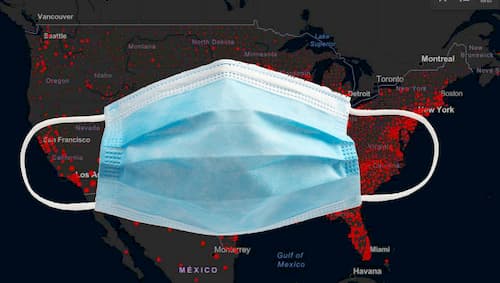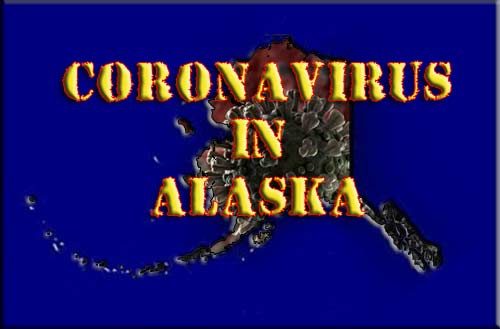Cases by Week Reported and Age Group

Alaska cases
17,597 COVID-19 cases total in AK residents, with 475 cumulative hospitalizations and 84 deaths. Cases are rising swiftly in most areas of the state and are currently projected to double every 22 days.
COVID-19 vaccine in AK
You can help distribute the COVID-19 vaccine in your clinic or facility once it is available. See the Alaska COVID-19 Vaccine Information Page for Healthcare Workers to sign up and for more information about the vaccine.
CARES Act funding deadline
Federal guidance for CARES funds is available here. To use these funds, cost must be incurred by December 30, which the guidance clarifies means that goods or services purchased with funds must be intended for delivery of goods or performance of services by December 30. There is a provision for a delay that is beyond the recipient’s control, but not for purchasing goods or services intended for after that date.
N95 mask reuse
Several studies have addressed N95 mask efficacy with reuse by qualitative or quantitative fit testing. According to a Medscape article, a physician presented to the 2020 ACEP conference a single-center uncontrolled study finding that on day 3 of use, 7 of 14 healthcare workers reported their mask no longer passed a qualitative fit test. Decontaminating and donning-doffing methods were not recorded and type of mask used varied. JAMA published a cross-sectional study in 68 healthcare workers found that duckbill-type N95s may not last as long as dome-type N95s, with duckbill-type N95s failing after 2 shifts on average (IQR 1-3) and dome-type N95s failing after an average of 4 shifts (IQR 3-5), again based on qualitative tests. A pre-pandemic qualitative study found six N95 models lasting for 5 consecutive donnings on average, and another found that 48% of subjects failed at least one fit test after re-donning an N95 but half of those then passed a later fit test, suggesting that donning technique may significantly influence fit test results. Some data also suggests that qualitative fit tests fail masks more often than quantitative fit tests. Clinicians may want to be mindful of donning practices when reusing N95 respirators, always perform a seal check and consider these data when deciding how many times to reuse a respirator.
[content id=”79272″]
Air travel outbreak
A 7 hour flight into Ireland in summer 2020 with only 17% occupancy resulted in an outbreak of 59 cases, 13 of which were associated with the flight itself (of 49 passengers and 12 crew). Some positive cases sat near each other and some did not. A mask was worn by 9 of the cases, one case (a child) did not wear a mask, and for three cases it could not be confirmed whether they had worn a mask or not. One person from the flight transmitted it to someone who infected 25 others, illustrating how readily contagious the virus is. The source case is not clear, as all on the flight who developed symptoms did so at least two days after the flight. Genetic studies in five cases traveling from three different continents found a single viral lineage, suggesting a single point source of infection on the flight despite masks and low occupancy.
Alaska COVID-19 deaths and hospitalizations
The Section of Epidemiology published bulletins summarizing COVID-19 deaths and COVID-19 hospitalizations in Alaska through October 15, 2020. Hospitalization rates during the study period were lower than national rates and highest among older adults, Alaska Native People and Native Hawaiian and Pacific Islanders. Many people who were hospitalized had one of several common chronic medical conditions known to be higher risk for severe COVID-19, such as cancer, chronic kidney disease, COPD, heart disease, obesity and/or T2DM. Death rates followed similar patterns.
In brief
Outpatient care of mild and moderate COVID-19
The NEJM published a clinical vignette and a review of relevant evidence and guidelines to form clinical recommendations for outpatient care of COVID-19. Notably, the article recommends against dexamethasone in non-hospitalized patients as it is not efficacious and may cause harm- based on results from the RECOVERY trial, a well-designed RCT where 2,104 hospitalized patients were randomized to receive dexamethasone, which showed no benefit and possible harm in patients not receiving respiratory support. NIH strongly recommends against dexamethasone in patients who do not need supplemental oxygen for the same reason. A recent news article noted a spike in off-label dexamethasone prescriptions.
Neutralizing antibody
A monoclonal antibody that binds the spike protein of SARS-CoV-2, preventing cell entry, was tested in a phase 2 randomized controlled trial in outpatients. Although bigger studies are needed to draw firm conclusions, viral load and symptoms seemed to decrease more in outpatients who received the neutralizing antibody than those who did not.
Immunity in Iceland
In a serum survey of more than 30,000 people in Iceland, of whom 4,222 had known SARS-CoV-2 exposure and 1,215 had tested positive, all but one person who had antibodies when first tested in recovery (n=443) still had them when tested again at least 30 days later, up to 4 months after a positive PCR test. 91% of those who had tested positive on PCR had antibodies against SARS-CoV-2. They found that 26.6% of quarantined persons with household exposure and 5.0% of quarantined persons without healthcare exposure were infected, based on positive PCR or antibody results. Overall, authors estimated that while 0.5% of Iceland residents have tested positive on PCR, results of the serosurvey suggest around 0.9% of Iceland residents have had COVID-19.








